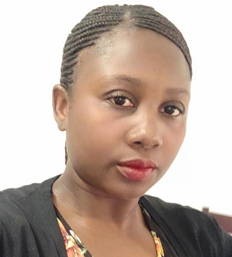
Dr. Tusekile Alfredy
Experience & Activities
Dr. Tusekile Alfredy is a Tanzanian materials scientist and researcher specializing in sustainable water treatment and environmental technologies. She holds both a Master’s and a PhD in Materials Science and Engineering from the Nelson Mandela African Institution of Science and Technology (NM-AIST) in Arusha, Tanzania. Her research focuses on developing innovative and cost-effective methods for water purification, including capacitive deionization, to remove chemical contaminants and improve access to safe drinking water. Dr. Alfredy is also a Regional Scholarship and Innovation Fund (RSIF) PhD scholar and an active member of the Organization for Women in Science for the Developing World (OWSD), contributing to scientific advancement and inspiring young scientists in Tanzania.
- Materials Science and Engineering
- Water Purification Technologies
- Energy Storage Devices
Nelson Mandela African Institution of Science and Technology (NM-AIST)
Dr. Alfredy is an assistant lecturer in the Department of Materials, Energy Science, and Engineering at NM-AIST in Arusha, Tanzania. She completed both her MSc and PhD in Materials Science and Engineering at this institution. Her research focuses on developing materials for water purification and energy storage. NM-AIST
Regional Scholarship and Innovation Fund (RSIF)
Dr. Alfredy is a scholar under RSIF, a program supported by the African Union, the World Bank, and other partners. RSIF aims to build a critical mass of PhD-trained scientists and engineers in Africa. Dr. Alfredy's research on capacitive deionization for water defluoridation is part of this initiative. RSIF-PASET
Organization for Women in Science for the Developing World (OWSD)
Dr. Alfredy is a member of OWSD, an international organization that supports women scientists in developing countries. OWSD provides a platform for networking, collaboration, and professional development.
UNESCO-L’Oréal For Women in Science Award (2024)
Dr. Alfredy was honoured with the UNESCO-L’Oréal For Women in Science Award in 2024, recognizing her innovative work in capacitive deionization (CDI) technology for water defluoridation. This award highlights her contributions to sustainable water treatment solutions and her role as a trailblazer for women in science. RSIF-PASET
Regional Scholarship and Innovation Fund (RSIF) Fellowship
As an RSIF PhD scholar, Dr. Alfredy received funding to pursue her doctoral research at the Nelson Mandela African Institution of Science and Technology (NM-AIST). Her research focused on developing electrode materials derived from chicken feathers for capacitive deionization, aiming to address water contamination challenges in Tanzania. RSIF-PASET
Organization for Women in Science for the Developing World (OWSD) Membership
In 2025, Dr. Alfredy became a full member of OWSD, an international organization that supports women scientists in developing countries. This membership provides her with a platform for networking, collaboration, and professional development in the field of materials science and engineering.
Capacitive Deionization for Water Treatment
Dr. Alfredy's work in capacitive deionization involves developing electrode materials derived from waste products, such as chicken feathers, to remove heavy metals and other pollutants from water. This approach not only addresses water contamination but also contributes to waste valorization. ResearchGate
Review on Water Defluoridation Using CDI
In 2022, Dr. Alfredy co-authored a review article titled "Capacitive deionization: a promising technology for water defluoridation" published in the journal Water Supply. The paper critically analyzes various electrode materials studied for water defluoridation, discussing their electrosorption capacities and fluoride removal efficiencies. The Hive
PhD Dissertation on Heavy Metal Removal
For her PhD dissertation at the Nelson Mandela African Institution of Science and Technology (NM-AIST), Dr. Alfredy focused on the "Removal of Heavy Metals from Water by Capacitive Deionization Electrode Materials Derived from Chicken Feathers." This research emphasized the synthesis of carbon materials for water treatment, showcasing the potential of using local waste materials in environmental remediation.
T Alfredy - 2024 - dspace.nm-aist.ac.tz
… I, Tusekile Alfredy, do hereby declare to the Senate of the Nelson Mandela African Institution
of Science and Technology that this Thesis titled “Metal Oxides Modified Carbon Electrode …
Save Cite Related articles All 2 versions Import into EndNote
T Alfredy - 2019 - dspace.nm-aist.ac.tz
Capacitive deionization (CDI) is an emerging desalination technology based on the principle
of electrical double layer capacitors. When the voltage is applied to the surface of the …
Save Cite Cited by 1 Related articles Import into EndNote
[PDF] Research Article Capacitive Deionization for the Removal of Paraquat Herbicide from Aqueous Solution
T Alfredy, J Elisadiki, YAC Jande - 2021 - academia.edu
In comparison to other conventional methods like adsorption and reverse osmosis (RO),
capacitive deionization (CDI) has only been investigated extensively for the removal of …
Save Cite Related articles Import into EndNote
FN Alphonce, T Alfredy, A Hilonga… - Desalination and Water …, 2023 - Elsevier
The present study aimed to investigate the efficacy of activated carbon (AC) electrode embedded
with naturally occurring metal oxides (MO) from rocks for antibacterial activities against …
Save Cite Related articles All 10 versions Import into EndNote
Area of specialization: Materials for water treatment and energy storage





 Visit Today : 973
Visit Today : 973 Visit Yesterday : 0
Visit Yesterday : 0 This Month : 973
This Month : 973 This Year : 120462
This Year : 120462 Total Visit : 807728
Total Visit : 807728